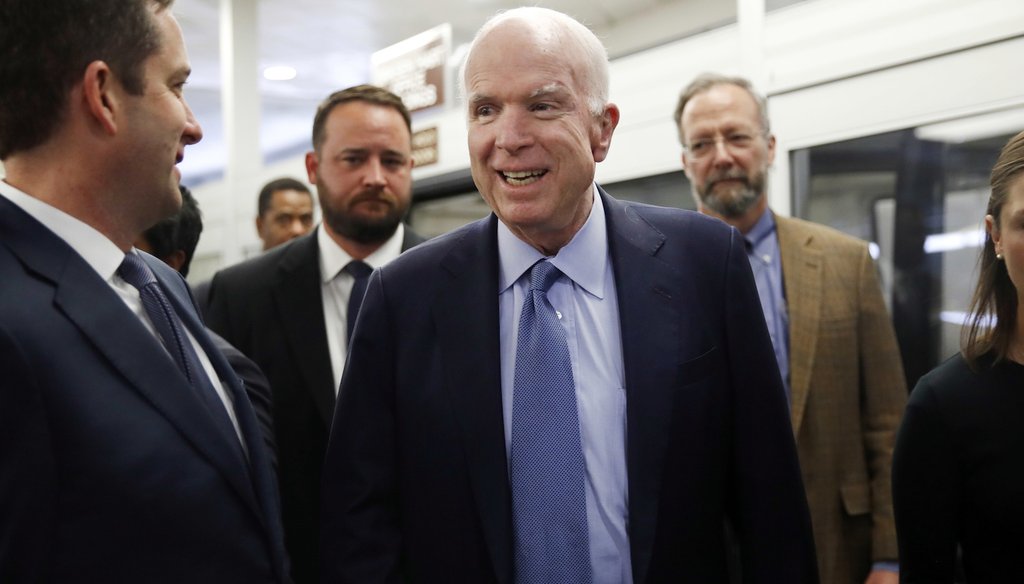Stand up for the facts!
Our only agenda is to publish the truth so you can be an informed participant in democracy.
We need your help.
I would like to contribute

Sen. John McCain, R-Ariz., on Oct. 19, 2017, on Capitol Hill in Washington. (AP Photo/Jacquelyn Martin)
John McCain, a former Republican presidential candidate and a longtime U.S. Senator for Arizona, died Saturday, Aug. 25. He was 81.
Known in recent years as one of the most vocal critics of President Donald Trump within the Republican Party, McCain had a long-established record of going his own way in both politics and policy.
PolitiFact fact-checked McCain regularly during the 2008 presidential campaign against Barack Obama. That was McCain’s second run for the presidency after losing the GOP primary to George W. Bush in 2000. (PolitiFact launched in 2007 so we did not fact-check the earlier race.)
John Sidney McCain III was born Aug. 29, 1936. Part of a military family, McCain graduated from the U.S. Naval Academy and served as a combat pilot in Vietnam. In 1967, McCain was shot down over Hanoi and spent five and a half years as a prisoner of war. After returning to the United States, he continued his military career and eventually entered politics from Arizona, first elected in 1982 to the U.S. House of Representatives. He entered the Senate in 1987 and served until his death.
McCain’s birth became the topic of a PolitiFact report in 2008 because McCain’s father, John S. McCain Jr., was serving in the Panama Canal zone when McCain’s mother Roberta gave birth. That means McCain wasn’t born in the United States. Would he still meet the Constitution’s requirement that a president be a "natural born" citizen? Experts told us he would have.
Over the years, McCain earned the reputation as being a "maverick" for his willingness to go his own way against the Washington establishment and the Republican Party. One of McCain’s eight Pants on Fire ratings came when he claimed he never considered himself a maverick. He actually used the designation repeatedly in his presidential campaign.
That independence at times caused fellow Republicans to be suspicious of McCain.
For example, in 2001 and again in 2003, McCain joined Democrats in voting against President George W. Bush's tax cut packages. The first time, he said the tax breaks didn't do enough for the middle class, and there was a need for increased defense spending. The second time, after the 9/11 terrorist attacks, he said cutting taxes was inadvisable in a time of war.
McCain was attacked from time to time by groups that sought to denigrate him and his Vietnam war record. In 2008, an alleged veterans’ group said that McCain was a "Hanoi Hilton songbird" who collaborated with the enemy. But the group provided scant evidence to back up this claim and was strongly contradicted by many other accounts, including interviews with other POWs, an author who has written a McCain biography and the senator's own accounts. PolitiFact rated the false attack as Pants on Fire. That attack appeared again recently after some of McCain’s criticism of President Trump.
One of McCain’s most notable causes was opposing the use of torture, an issue that came to the fore during the Iraq War when the Bush administration interrogated terrorist suspects and people captured in Iraq. At times, some accused McCain of wavering when he didn’t vote in favor of specific proposals.
But PolitiFact examined McCain’s votes and public comments and found no evidence that he ever softened his opposition. He earned a No Flip on our Flip-O-Meter.
McCain continued to speak against torture in 2018, when he opposed Trump’s nomination of Gina Haspel as head of the CIA. (Haspel was confirmed and now serves.)
In a May 2018 statement, McCain said:
"I know that those who used enhanced interrogation methods and those who approved them wanted to protect Americans from harm. I appreciate their dilemma and the strain of their duty. But as I have argued many times, the methods we employ to keep our nation safe must be as right and just as the values we aspire to live up to and promote in the world."
Our Sources
PolitiFact, John McCain's file, accessed Aug. 26, 2018
Biographical Directory of the United States Congress, John McCain, accessed Aug. 26, 2018
John McCain Senate website, McCain on nomination of Gina Gaspel to be CIA director, May 9, 2018



















































